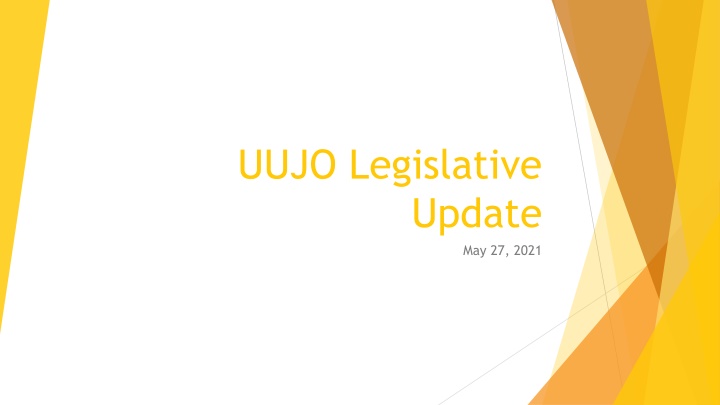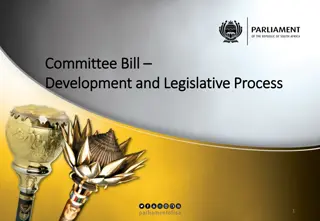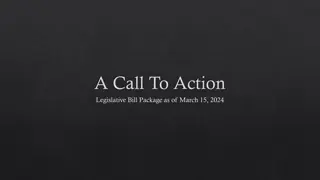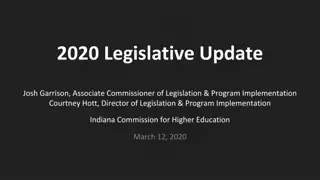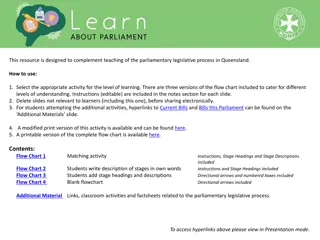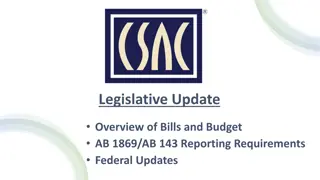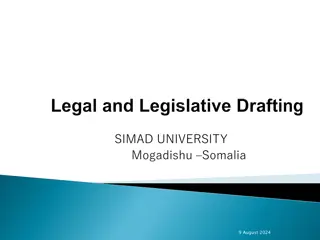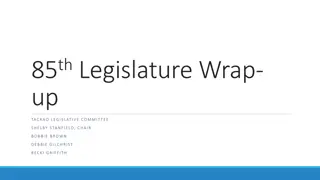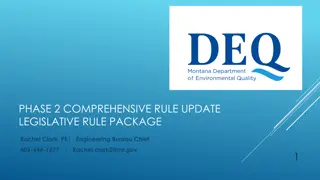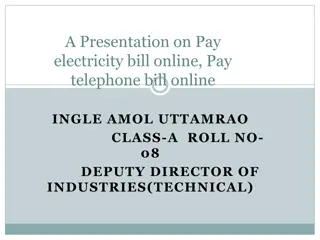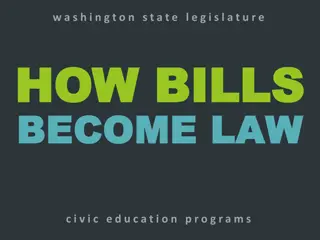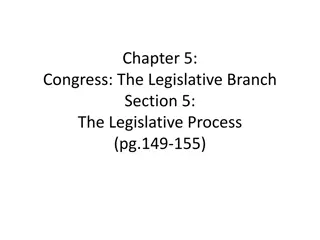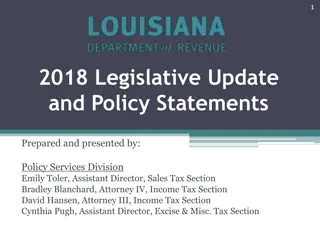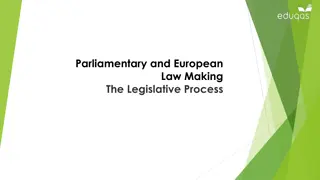Legislative Update: Overview of New Bills and Restricting Education - May 27, 2021
This legislative update covers the introduction of various bills related to bail, elections, school, and the environment. Specifically, it delves into HB.322 and HB.327, addressing the teaching of current events, divisive concepts, and controversial issues in public schools, as well as restrictions on teachers regarding certain concepts related to race and sex within the education system.
Download Presentation

Please find below an Image/Link to download the presentation.
The content on the website is provided AS IS for your information and personal use only. It may not be sold, licensed, or shared on other websites without obtaining consent from the author.If you encounter any issues during the download, it is possible that the publisher has removed the file from their server.
You are allowed to download the files provided on this website for personal or commercial use, subject to the condition that they are used lawfully. All files are the property of their respective owners.
The content on the website is provided AS IS for your information and personal use only. It may not be sold, licensed, or shared on other websites without obtaining consent from the author.
E N D
Presentation Transcript
UUJO Legislative Update May 27, 2021
Overview of New or Updated Bills Bail Election HB 315 HB 294 SB 182 HB 296 HB 306 HB 313 School HB 322 Environment HB 327 HB 282 HB 300
Restricting Education HB 322 Introduced 5/25 HB 327 Introduced 5/25 Regarding the teaching of certain current events and certain concepts regarding race and sex in public schools. Prohibit school districts, community schools, STEM schools, and state agencies from teaching, advocating, or promoting divisive concepts.
Restricting Education HB 322 pt. 1 Sec. 3313.6027. (A) No state agency, school district, or school administration shall require a teacher of history, civics, United States government and politics, social studies, or similar subject areas who is employed by the board of education of a school district to discuss current events or widely debated and currently controversial issues of public policy or social affairs. (C) If a student completes a course that includes any of the concepts described in divisions (A)(1) to (11) of this section, that course shall not count towards the requirements for high school graduation specified in section 3313.603 of the Revised Code. Sec. 3313.6029. No teacher shall be required by a policy of any state agency, school district, or school administration to affirm a belief in the systemic nature of racism, or like ideas, or in the multiplicity or fluidity of gender identities, or like ideas, against the teacher's sincerely held religious or philosophical convictions. At no time shall the state board adopt any model curriculum under this section regarding the concepts described in divisions (A)(1) to (11) of section 3313.6028 of the Revised Code.
Restricting Education HB 322 pt. 2 (A)(1) to (11) of section 3313.6028 of the Revised Code. (1) One race or sex is inherently superior to another race or sex; (2) An individual, by virtue of the individual's race or sex, is inherently racist, sexist, or oppressive, whether consciously or unconsciously; (3) An individual should be discriminated against or receive adverse treatment solely or partly because of the individual's race; (4) Members of one race cannot or should not attempt to treat others without respect to race; (5) An individual's moral standing or worth is necessarily determined by the individual's race or sex; (6) An individual, by virtue of the individual's race or sex, bears responsibility for actions committed in the past by other members of the same race or sex; (7) An individual should feel discomfort, guilt, anguish, or any other form of psychological distress on account of the individual's race or sex; (8) Meritocracy or traits such as a hard work ethic are racist or sexist or were created by members of a particular race or sex to oppress members of another race or sex; (9) Fault, blame, or bias should be assigned to a race or sex or to members of that race or sex because of their race or sex; (10) The advent of slavery in the territory that is now the United States constituted the true founding of the United States; (11) With respect to their relationship to American values, slavery and racism are anything other than deviations from, betrayals of, or failures to live up to the authentic founding principles of the United States, which include liberty and equality.
Restricting Education HB 327 pt. 1 "Divisive concepts" means the concepts that: (a) One nationality, color, ethnicity, race, or sex is inherently superior to another nationality, color, ethnicity, race, or sex. (b) The United States is fundamentally racist or sexist. (c) An individual, by virtue of the individual's nationality, color, ethnicity, race, or sex, is inherently racist, sexist, or oppressive, whether consciously or unconsciously. (d) An individual should be discriminated against or receive adverse treatment solely or partly because of the individual's nationality, color, ethnicity, race, or sex. (e) Members of one nationality, color, ethnicity, race, or sex cannot and should not attempt to treat others without respect to nationality, color, ethnicity, race, or sex. (f) An individual's moral character is necessarily determined by the individual's nationality, color, ethnicity, race, or sex. (g) An individual, by virtue of the individual's nationality, color, ethnicity, race, or sex, bears responsibility for actions committed in the past by other members of the same nationality, color, ethnicity, race, or sex. (h) Meritocracy or traits such as a hard work ethic are racist or sexist or were created by a particular nationality, color, ethnicity, race , or sex to oppress another nationality, color, ethnicity, race , or sex. (i) Any other form of race or sex stereotyping or any other form of race or sex scapegoating.
Restricting Education HB 327 pt. 2 (B)(1) No school district shall teach, instruct, or train any divisive concepts , nor shall any school district require a student to advocate for or against a specific topic or point of view to receive credit for any coursework. (2) No school district shall accept private funding for the purpose of developing a curriculum, purchasing or selecting course materials, or providing teacher training or professional development for a course promoting divisive concepts. (D) Nothing in this section shall be construed to prohibit discussing or using supplemental instructional materials, as part of a larger course of academic instruction, to teach divisive concepts in an objective manner and without endorsement. Such materials may include the following: (1) The history of an ethnic group, as described in textbooks and instructional materials adopted in accordance with the Revised Code concerning textbooks and instructional materials; (2) The impartial discussion of controversial aspects of history; (3) The impartial instruction on the historical oppression of a particular group of people based on race, ethnicity, class, nationality, religion, or geographic region; (4) Historical documents permitted under statutory law, such as the national motto, the national anthem, the Ohio Constitution, the United States Constitution, the Revised Code, federal law, and United States Supreme Court decisions.
Bail Reform SB182 & HB 315 Requires the court to make an ability to pay inquiry if the court intends to set a secured bond as a condition of release for the accused. Modifies existing law by requiring that any person charged with a misdemeanor be released on an unsecured bond or after a conditions of release hearing and any person charged with a violation of a municipal ordinance be released on an unsecured bond for the person s appearance, instead of allowing the person to give bail. Repeals existing laws regarding the form of bail, detention where bail not granted or sufficient bail not offered, recognizance or deposit for appearance of accused, and forfeiture of bail proceedings
